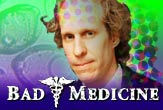The Big Fat Truth

Get the world’s most fascinating discoveries delivered straight to your inbox.
You are now subscribed
Your newsletter sign-up was successful
Want to add more newsletters?

Delivered Daily
Daily Newsletter
Sign up for the latest discoveries, groundbreaking research and fascinating breakthroughs that impact you and the wider world direct to your inbox.

Once a week
Life's Little Mysteries
Feed your curiosity with an exclusive mystery every week, solved with science and delivered direct to your inbox before it's seen anywhere else.

Once a week
How It Works
Sign up to our free science & technology newsletter for your weekly fix of fascinating articles, quick quizzes, amazing images, and more

Delivered daily
Space.com Newsletter
Breaking space news, the latest updates on rocket launches, skywatching events and more!

Once a month
Watch This Space
Sign up to our monthly entertainment newsletter to keep up with all our coverage of the latest sci-fi and space movies, tv shows, games and books.

Once a week
Night Sky This Week
Discover this week's must-see night sky events, moon phases, and stunning astrophotos. Sign up for our skywatching newsletter and explore the universe with us!
Join the club
Get full access to premium articles, exclusive features and a growing list of member rewards.
Federal and state agencies are hoping to regulate an industrial poison responsible for perhaps 100,000 deaths per year in the United States.
The poison is produced by mixing certain liquid organic chemicals with industrial catalysts such as platinum or palladium to alter the chemical bonds. The altered version takes on a solidified form useful for industry but, apparently, deadly for humans.
Like asbestos, these chemicals were once heralded for their copious beneficial properties, and they found their way into everyday products. Removing these poisons from the environment will take great political will, encountered by resistance from industry every step of the way.
You wouldn't think that regular folks would object to banning such a harmful class of chemicals, but they do. We're talking about trans fats, created in laboratories, like a Frankenstein monster, in an attempt to make a better dietary fat out of plant oils by zapping them with energy.
Trans fats have largely replaced butter and lard in commercial bake goods and fast foods. Advocates say they lower food costs, allowing poor people better access to french fries and other junk foods. They extend shelf life, too, which saves somebody money. Opponents say the only problem with this convenient scenario is that trans fats cause a lot of heart disease.
The food police
Americans don't take lightly to bans, as illustrated by the ridicule thrown at New York City's plan to eliminate trans fats from its 20,000 restaurants, announced Sept. 26. The typical cries went up about infringement of personal liberties and the rise of food Nazis.
Get the world’s most fascinating discoveries delivered straight to your inbox.
Smoking bans encountered similar resistance. Those bans were easier to enforce, though. Second-hand smoke is annoying. And as taxpayers, we have to pay for a smoker's personal freedom—astronomical cancer rates, the filth of cigarettes butts so carelessly tossed about, and fires caused by cigarettes.
Yet this new proposal isn't a ban on food, as restaurant associations and food conglomerates paint it to be. This is a ban on a manmade food additive. And this isn't about personal choice. This is about their choice, the food producers. Like nicotine, a trans fat is something deliberately added to a product to produce a desired effect.
Food made better through chemistry
Fats, often maligned, are vital for proper nutrition. Fatty acids are the raw materials that help regulate blood pressure, blood clotting, inflammation and other body functions. But fats are not created equally.
There are three categories: saturated (solid at room temperature), unsaturated (liquid at room temperature) and trans fats. The healthiest are unsaturated, which means the fat molecule's carbon backbone isn't saturated, or maxed out, with hydrogen atoms. Saturated fats, mostly from dairy and meat products, are not as healthy, although they do contain valuable nutrients.
Trans fats offer no nutrition. Worse, they raise levels of LDL, the bad cholesterol, and lower levels of HDL, the good cholesterol, according to numerous studies. They lead to more rapid weight gain and abdominal fat, as first reported by Wake Forest University researchers. And some studies show a link to diabetes and poor liver function. Harvard School of Public Health's conservative estimate is at least 30,000 deaths annually from eating trans fats, and perhaps as high as 100,000 deaths.
While small amounts of trans fats are present naturally in milk and beef, most trans fats are from an industrial process. Food producers create it by partially saturating plant oils, breaking certain chemical bonds so that the carbon atoms align straight and remain solid at room temperature.
A fat's fall from grace
Trans fats such as margarine and the original Crisco were once touted as healthy alternatives to butter and lard, which are natural saturated fats. Some groups, perhaps to their embarrassment today, petitioned fast-food restaurants to replace saturated fats with trans fats.
Trans fats are now universally vilified by health experts. Denmark outright banned the fat in 2003, meaning no trans fat in the Danish danish. The European Union is mulling a similar ban. The U.S. Food and Drug Administration, as of 2006, requires food manufacturers to list the amount of trans fat in their products. Although, typical of sneaky foods laws here, levels less than 0.5 grams per serving can be labeled as zero grams and thus "trans fat free."
Some health nuts among us might be troubled by the proposed ban. Vegetarians and vegans will need to search for new snacks if lard and butter are used instead of vegetable shortening.
By the numbers
Both the WHO and NIH say that a daily diet should contain about 20-30 percent healthy fat, or no more than 65 grams in a 2,000-calorie diet. (Fat has 9 calories per gram.) Of total fat, 20 grams can be saturated, although less is better.
A large order of fries at McDonalds has 30 grams of fat, with 6 grams saturated and 8 grams trans fats. Every gram matters. Replacing only 2 percent of calories from trans fat with a non-trans unsaturated fat cuts the risk of heart disease by more than half, according to Harvard researchers. They found that cutting trans fats—far more than cutting saturated or total fat—is the best way to lower the risk of heart attack and strokes.
A ban on trans fats won't seem draconic if the fat is viewed as a nasty chemical additive, like certain food dyes. This isn't a steppingstone to a Big Brother situation. Alcohol and saturated fats, for example, are safe within reason and are indeed pleasurable. Artificial trans fats will never be missed.
Christopher Wanjek is the author of the books “Bad Medicine” and “Food At Work.” Got a question about Bad Medicine? Email Wanjek. If it’s really bad, he just might answer it in a future column. Bad Medicine appears each Tuesday on LIveScience.
More to Explore
- The Biggest Popular Myths
- Top 10 Mysterious Diseases
- Urban Legends Debunked

Christopher Wanjek is a Live Science contributor and a health and science writer. He is the author of three science books: Spacefarers (2020), Food at Work (2005) and Bad Medicine (2003). His "Food at Work" book and project, concerning workers' health, safety and productivity, was commissioned by the U.N.'s International Labor Organization. For Live Science, Christopher covers public health, nutrition and biology, and he has written extensively for The Washington Post and Sky & Telescope among others, as well as for the NASA Goddard Space Flight Center, where he was a senior writer. Christopher holds a Master of Health degree from Harvard School of Public Health and a degree in journalism from Temple University.
 Live Science Plus
Live Science Plus










